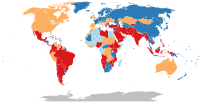
Photo from wikipedia
Background The COVID-19 pandemic disrupted the delivery of surgical services. The purpose of this communication is to report the impact of the pandemic on surgical training and learner wellbeing and… Click to show full abstract
Background The COVID-19 pandemic disrupted the delivery of surgical services. The purpose of this communication is to report the impact of the pandemic on surgical training and learner wellbeing and to document adaptations made by surgery departments. Study Design A 37-item survey was distributed to educational leaders in general surgery and other surgical specialty training programs. It included both closed- and open-ended questions and the self-reported stages of GME during the COVID-19 pandemic as defined by the Accreditation Council for Graduate Medical Education (ACGME). Statistical associations for items with Stage were assessed using categorical analysis. Results The response rate was 21% (472/2,196). U.S. Stage distribution (n=447) was Stage 1 22%, Stage 2 48%, Stage 3 30%. Impact on clinical education significantly increased by Stage with severe reductions in non-emergency operations (73%and 86% vs.98%) and emergency operations (8% and 16% vs. 34%). Variable effects were reported on minimal expected case numbers across all stages. Reductions were reported in outpatient experience (83%), in-hospital experience (70%), and outside rotations (57%). Increases in ICU rotations were reported with advancing stage (7%and 13%vs.37%). Severity of impact on didactic education increased with stage (14%and 30% vs.46%). Virtual conferences were adopted by 97% across all stages. Severity of impact on learner wellbeing increased by Stage: physical safety (6%and 9%vs.31%), physical health (0% and 7%vs.17%), emotional health (11% and 24%vs.42%). Regardless of stage most, but not all, made adaptations to support trainees’ wellbeing. Conclusion The pandemic adversely impacted surgical training and wellbeing of learners across all surgical specialties proportional to increasing ACGME Stage. There is a need to develop education disaster plans, to support technical competency, and learner wellbeing. Careful assessment for program advancement will also be necessary. The experience during this pandemic shows that virtual learning and telemedicine will have significant impact on the future of surgical education.
Journal Title: Journal of the American College of Surgeons
Year Published: 2020
Link to full text (if available)
Share on Social Media: Sign Up to like & get
recommendations!